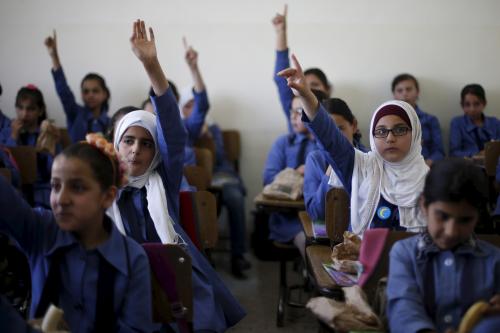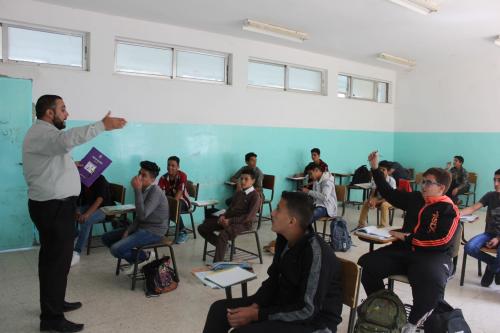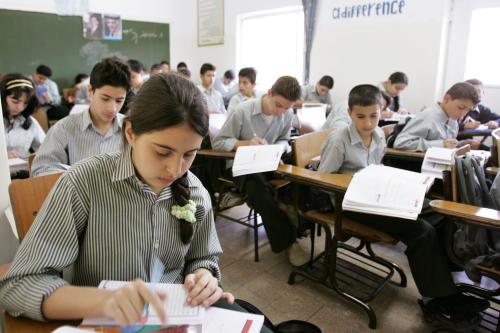Editor’s Note: This blog series discusses select case studies, and what makes them interesting, that have been chosen for preliminary research by the Millions Learning project at the Brookings Center for Universal Education.
July 15th marks the world’s first International Youth Skills Day, a day to reflect on the importance of young people developing the skills, competencies, and knowledge they need for a safe and dignified livelihood. One organization that is already responding to this challenge is INJAZ.
What is INJAZ?
In partnership with the public and private sector, INJAZ trains young people in Jordan to develop the soft and hard skills necessary to become competitive job candidates and successful entrepreneurs. Over the past 15 years, INJAZ has reached over one million young people in secondary schools, universities, and youth centers across Jordan through a multi-stage growth and positioning strategy, driven in part by visionary leadership, private sector engagement, and local champions.
INJAZ is responding to a shared regional struggle in the Middle East of growing youth populations paired with limited job opportunities by preparing youth to become productive members of their society and accelerate the development of the national economy. While the Middle East and North Africa experienced three percent growth during 2013-2014, the region has the highest unemployment rates in the world, particularly among youth aged 15 to 24-years-old.
How has INJAZ grown?
INJAZ started in 1999 as a project under Save the Children with $4.9 million funding from USAID. Initially, it began as an extracurricular afterschool activity. In 2001, INJAZ was formally launched as a Jordanian NGO under the patronage of Her Majesty Queen Rania Al Abdullah. By 2002, INJAZ’s program was incorporated into the formal school class hours by allocating 40 minutes weekly to deliver the program.
In its early stages, INJAZ partnered with Junior Achievement (JA) and received the rights to use JA’s curricula in return for a yearly fee. During this time and with multiple years of generous support from USAID, INJAZ began developing and piloting its own curriculum in schools based on local needs. Today, INJAZ is a self-sustaining local organization with programs implemented across all 12 governorates through approximately 300 educational institutions and 40 universities and colleges every year.
How does INJAZ do it?
Engaging the private sector. INJAZ adopts a unique approach to training students by partnering with private sector companies and engaging their qualified staff as unpaid trainers, or “volunteers,” to teach INJAZ programs at schools and universities. Private sector volunteers commit to teaching INJAZ courses for one hour per week for six to eight weeks every fall and spring semester depending on the nature of the course. A cadre of more than 800 individuals volunteers at approximately 1,300 sessions each year, forming the largest network of committed volunteers in Jordan today. A byproduct of this collaboration has been advancing a culture of volunteerism in Jordan. Beyond volunteering to teach, private sector companies support INJAZ by adopting schools, sharing information and data, and providing employment and internship opportunities to graduates.
Benefitting from visionary leadership. Much of the scaling success lies in the leadership of INJAZ. In 2004, a visionary social entrepreneur, Deema Bibi, was brought on to systematize, scale up, and sustain INJAZ as one of the leading youth employment organizations in Jordan. Bibi’s growth strategy was to expand the program in both reach and impact. She has strengthened INJAZ’s foundation by building institutional capacity and financial sustainability, and putting into place systems and procedures so that the institution could operate independently. Within three years of her arrival, INJAZ reached all 12 governorates throughout Jordan.
Leveraging local champions. Her Majesty Queen Rania’s early support has been instrumental in providing INJAZ with credibility and access to a wider network. The governmental King Abdullah II Fund for Development has also given significant support to INJAZ as it serves as the umbrella under which INJAZ operates in universities. Additionally, government support, specifically INJAZ’s partnership with Jordan’s Ministry of Education, has been crucial for scaling the school program, given the ministry’s role in institutionalizing and accrediting programs in schools. In 2010, the Ministry of Planning and International Cooperation (MoPIC) became another key partner in helping INJAZ expand into Jordanian universities and colleges.
INJAZ’s Board of Trustees, comprised of representatives of well-established local and international companies and organizations, has also provided valuable insight into the local business and political environment. This contributes to the design of different INJAZ programs and sets the direction of the organization’s growth. The 50 CEO-level board members also contribute to the sustainability of INJAZ by making a contribution of $10,000 each (approximately 7,000 Jordanian dinars), a practice that started by the end of 2005 and has helped significantly in growing the organization.
Challenges on the horizon
There are three main challenges that INJAZ will need to continue to address as it enters this next phase of independence and expansion. These include:
- Ensuring sustainability. It will be interesting to watch as INJAZ manages its newly found independence from USAID. Given that its leadership has been planning for sustainability over the past 10 years, it should be in a good position to weather some of the inevitable challenges ahead. These will likely include building financial sustainability beyond the generous annual contributions provided by its board, as well as maintaining costs and quality as INJAZ continues to expand to other types of learning environments (e.g., in and out of school), across education levels, and in its updated methods of delivery. The variations in INJAZ’s model have cost implications as well as risks to the program’s fidelity, but have been considered essential by INJAZ’s leadership for growth and quality of delivery.
- Measuring impact. It is clear that students’ exposure to entrepreneurial and workforce skills has grown through INJAZ’s expansion. While INJAZ began as an extracurricular pilot project today it is participating in the national education system by offering courses addressing life skills, entrepreneurial skills, social and financial education, and many other market required skills. What is less clear, however, is what measurable impact this exposure is having on young people’s employment opportunities, civic engagement, life skills, and leadership skills. INJAZ will need to continue to rigorously test, report, and adjust based on these outcome metrics.
- Standardizing volunteer engagement. One of the challenges of having such a large cadre of unpaid volunteers is the variability in quality. Volunteers come to INJAZ with a range of relevant training experience. It appears that the impact of each INJAZ class depends heavily on the volunteer’s ability to interpret the curriculum and present it appropriately to the class. Therefore, to help ensure the impact of its courses on students, INJAZ is has put into place a mandatory training at the beginning of each semester prior to teaching a class.
We look forward to learning from INJAZ as the organization continues to grow and evolve and sharing these experiences through the Millions Learning project.











Commentary
Getting millions to learn: INJAZ works for greater youth employability in Jordan
July 10, 2015